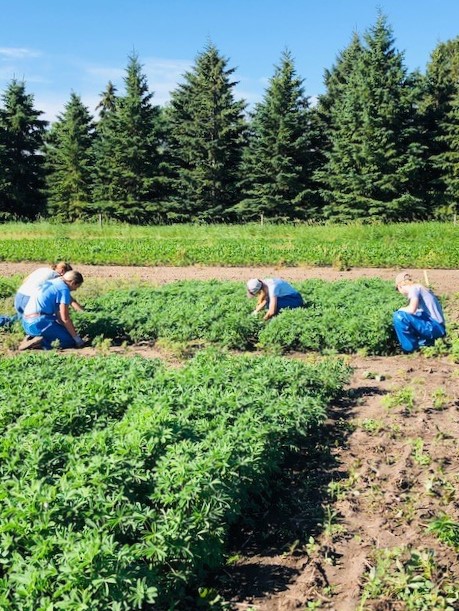We Get By, With (a lot of) Help
During the summer, we double our staff by hiring high school and college students, grad students and interns. This week, we want to thank our summer crew for some of the things they do:
- Packaging seed and fertilizer for trials. The experienced and proven ride planters, pouring seed and fertilizer into our plot-scale equipment as trials are established.
- Stand counts. We know how many seeds we planted, but how many sprouted and developed into a plant? And thinning to achieve a specific plant population in each replication of a trial.
- Hand-weeding. Sometimes for esthetics, but mostly per protocol.

Some of the summer crew hand-weeding in the plots.
- Collecting samples like soil, roots, leaves, stems, and seed. One team has exclusively been digging, washing and evaluating lentils and peas for root rot in our root disease management studies.
- A team has been constructing micro-irrigation sprinkler systems in our pathology studies (we’ll have approximately 40 acres of mist systems this year).
- Our most-experienced summer crew are or were agronomy students at NDSU (Go Bison!) and possess certifications that allow them to apply pesticide treatments. Our veterans also have the knowledge base required to take field notes -- recording plant maturity, height, and disease level; and measuring plant health with GreenSeeker infrared light meters.
- One of our interns flies UAV drones, collecting thousands of images per flight, and programs software to stitch those images into field maps.
- An Integrated Pest Management crop scout surveys for disease and insect pests on wheat, barley, sunflower, and soybean. GPS coordinates are recorded with pest data, and maps are posted online for producers and crop consultants.
- Specific varieties of berries are replicated in our orchard, and yields and quality are measured per trial. Each bush must be picked separately and consistently.
- We replicate livestock trials and follow care and feeding protocols for each pen. Extra summer help fixes fence, mows yards, and bales hay and straw. Moving and weighing cattle go better with additional help, too.
- Yard work ranges from trimming trees to weed eating and includes at least one round of cleaning gutters every summer.
- Ever heard, “if you’ve got time to lean, you’ve got time to clean”? (Insert eye-roll here.) With more than 70 people, over two dozen buildings, and a fleet of vehicles and farm equipment, there is always a floor to sweep or vacuum, a car to wash, trash to collect, and windows to clean.

Digging for roots.
Our 60th Annual Field Day is Tuesday, July 16. Our summer crew will be very visible, as usual, greeting every vehicle that arrives, directing guests to parking and seating, and handing out programs. They will have set up every table and chair, will be escorting guests as needed, will haul trash during the day, and will clean everything as it’s put away.
Along with contributing a lot of hard work, our summer crew keeps us young and thinking of fresh ways to approach life. It’s a sure sign of spring when the early birds of our summer crew stop in to start their hiring paperwork, and it’s a sad day when the last of the crew leaves - another reminder of how short our North Dakota summers are.
Thanks, Summer Crew, for everything you do. We appreciate you.
CREC Staff
NDSU.Carrington.REC1@ndsu.edu


